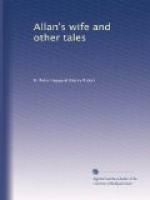I awoke just as the dawn was beginning to flame across the sky in sheets of primrose and of gold, or rather it was little Tota who woke me by kissing me as she lay between sleep and waking, and calling me “papa.” It wrung my heart to hear her, poor orphaned child. I got up, washed and dressed her as best I could, and we breakfasted as we had supped, on biltong and biscuit. Tota asked for milk, but I had none to give her. Then we caught the horses, and I saddled mine.
“Well, Indaba-zimbi,” I said, “now what path do your bones point to?”
“Straight north,” he said. “The journey will be hard, but in about four days we shall come to the kraal of a white man, an Englishman, not a Boer. His kraal is in a beautiful place, and there is a great peak behind it where there are many baboons.”
I looked at him. “This is all nonsense, Indaba-zimbi,” I said. “Whoever heard of an Englishman building a house in these wilds, and how do you know anything about it? I think that we had better strike east towards Port Natal.”
“As you like, Macumazahn,” he answered, “but it will take us three months’ journey to get to Port Natal, if we ever get there, and the child will die on the road. Say, Macumazahn, have my words come true heretofore, or have they not? Did I not tell you not to hunt the elephants on horseback? Did I not tell you to take one waggon with you instead of two, as it is better to lose one than two?”
“You told me all these things,” I answered.
“And so I tell you now to ride north, Macumazahn, for there you will find great happiness—yes, and great sorrow. But no man should run away from happiness because of the sorrow. As you will, as you will!”
Again I looked at him. In his divinations I did not believe, yet I came to the conclusion that he was speaking what he knew to be the truth. It struck me as possible that he might have heard of some white man living like a hermit in the wilds, but preferring to keep up his prophetic character would not say so.
“Very well, Indaba-zimbi,” I said, “let us ride north.”
Shortly after we started, the river we had followed hitherto turned off in a westerly direction, so we left it. All that day we rode across rolling uplands, and about an hour before sunset halted at a little stream which ran down from a range of hills in front of us. By this time I was heartily tired of the biltong, so taking my elephant rifle—for I had nothing else—I left Tota with Indaba-zimbi, and started to try if I could shoot something. Oddly enough we had seen no game all the day, nor did we see any on the subsequent days. For some mysterious reason they had temporarily left the district. I crossed the little streamlet in order to enter the belt of thorns which grew upon the hill-side beyond, for there I hoped to find buck. As I did so I was rather disturbed to see the spoor of two lions in the soft sandy edge of a pool. Breathing a




